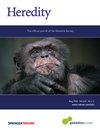Detection of positive selection on depression-associated genes
IF 3.9
2区 生物学
Q2 ECOLOGY
引用次数: 0
Abstract
Although depression significantly impacts fitness, some hypotheses suggest that it may offer a survival benefit. However, there has been limited systematic investigation into the selection pressures acting on genes associated with depression at the genomic level. Here, we conducted comparative genomic analyses and computational molecular evolutionary analyses on 320 depression-associated genes at two levels, i.e., across the primate phylogeny (long timescale selection) and in modern human populations (recent selection). We identified seven genes under positive selection in the human lineage, and 46 genes under positive selection in modern human populations. Most positively selected variants in modern human populations were at UTR regions and non-coding exons, indicating the importance of gene expression regulation in the evolution of depression-associated genes. Positively selected genes are not only related to immune responses, but also function in reproduction and dietary adaptation. Notably, the proportion of depression-associated genes under positive selection was significantly higher than the positively selected genes at the genome-wide average level in African, East Asian, and South Asian populations. We also identified two positively selected loci that happened to be associated with depression in the South Asian population. Our study revealed that depression-associated genes are subject to varying selection pressures across different populations. We suggest that, in precision medicine—particularly in gene therapy—it is crucial to consider the specific functions of genes within distinct populations.

抑郁症相关基因正选择检测。
尽管抑郁会显著影响健康,但一些假设认为它可能提供生存优势。然而,在基因组水平上,对选择压力作用于与抑郁症相关的基因的系统调查有限。在这里,我们对320个抑郁症相关基因进行了比较基因组分析和计算分子进化分析,在两个水平上,即跨灵长类系统发育(长时间尺度选择)和现代人类群体(近期选择)。我们在人类谱系中鉴定出7个正选择基因,在现代人群中鉴定出46个正选择基因。现代人群中大多数正选择变异位于UTR区域和非编码外显子,表明基因表达调控在抑郁症相关基因进化中的重要性。正选择基因不仅与免疫应答有关,还与生殖和饮食适应有关。值得注意的是,在非洲、东亚和南亚人群中,抑郁相关基因在正选择下的比例显著高于正选择基因在全基因组平均水平上的比例。我们还确定了两个阳性选择的基因座,它们恰好与南亚人群的抑郁症有关。我们的研究表明,在不同的人群中,与抑郁相关的基因受到不同的选择压力。我们建议,在精准医疗中,特别是在基因治疗中,考虑不同人群中基因的特定功能是至关重要的。
本文章由计算机程序翻译,如有差异,请以英文原文为准。
求助全文
约1分钟内获得全文
求助全文
来源期刊

Heredity
生物-进化生物学
CiteScore
7.50
自引率
2.60%
发文量
84
审稿时长
4-8 weeks
期刊介绍:
Heredity is the official journal of the Genetics Society. It covers a broad range of topics within the field of genetics and therefore papers must address conceptual or applied issues of interest to the journal''s wide readership
 求助内容:
求助内容: 应助结果提醒方式:
应助结果提醒方式:


